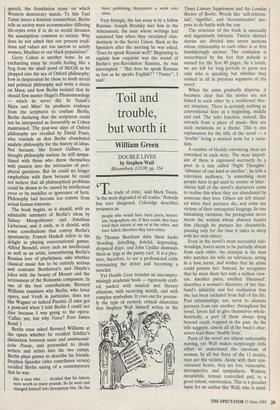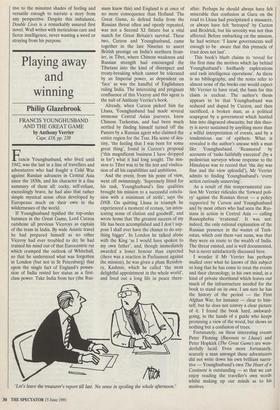Toil and trouble, but worth it
William Green
DOUBLE LIVES by Stephen Wall Bloomsbury, £13.99, pp. 154 The trade of critic,' said Mark Twain, 'is the most degraded of all trades.' Nobody has ever disagreed. Coleridge describes reviewers as
people who would have been poets, histori- ans, biographers, etc, if they could; they have tried their talents at one or at the other, and have failed; therefore they turn critics.
Sir Thomas Beecham dubs these hacks 'drooling, drivelling, doleful, depressing, dropsical drips', and John Updike dismisses them as 'pigs at the pastry cart'. It is a plea- sure, therefore, to see a professional critic renouncing the drivel and becoming a novelist.
Yet Double Lives remains an uncompro- misingly academic book — rigorously craft- ed, packed with musical and literary allusions, with recurring motifs, and with complex symbolism. It cries out for precise- ly the type of esoteric critical dissection that Stephen Wall himself writes in the Times Literary Supplement and the London Review of Books. Words like 'self-referen- tial', 'signifier', and `deconstructive' pre- pare to do battle with the text.
The structure of the book is unusually and ingeniously intricate. Twelve distinct stories are divided into seven sections whose relationship to each other is at first bewilderingly unclear. The confusion is exacerbated by the fact that nobody is named for the first 49 pages. As a result, we are left for long periods to guess not only who is speaking but whether they existed at all in previous segments of the novel.
When the mists gradually disperse, it becomes clear that the stories are not linked to each other by a traditional liter- ary structure. There is certainly nothing as conventional here as a beginning, middle and end. The tales function, instead, like extracts from a piece of music: they are each variations on a theme. This is one explanation for the title of the novel — a 'double' being a musical term for a varia- tion.
A number of bleakly convincing ideas are reworked in each story. The most import- ant of these is expressed succinctly by a poet in a tale called 'Night Thoughts'. 'Absence of one kind or another ', he tells a television audience, 'is something most people have to get used to, sooner or later.' About half of the novel's characters come to realise this when they are abandoned by someone they love. Others are left strand- ed when their partners die, and some are victims of their unrequited longings. In one tantalising variation, the protagonist never meets the woman whose absence haunts him (though he pursues her obsessively, pausing only for the time it takes to sleep with her twin sister).
Even in the novel's most successful rela- tionships, lovers seem to be partially absent from each other. An example is the man who watches his wife on television, acting in a love scene, and wishes that he alone could possess her. Instead, he recognises that he must share her with a million view- ers. Another piece, entitled 'Harassed', describes a woman's discovery of her hus- band's infidelity and her realisation that she has been excluded from half of his life. Past relationships, too, serve to alienate partners from one another: throughout the novel, lovers fail to give themselves whole- heartedly, a part of them always lying beyond reach, trapped in the past. As the title suggests, almost all of the book's char- acters lead these 'double lives'.
Parts of the novel are almost unbearably moving, yet Wall makes surprisingly little effort to understand the emotions of women. In all but three of the 12 stories, men are the victims. Alone with their con- valescent hearts, they are lost, vulnerable, introspective and sympathetic. Women, meanwhile, remain controlled and, to a great extent, emotionless. This is a peculiar lapse for an author like Wall, who is sensi- tive to the minutest shades of feeling and versatile enough to narrate a story from any perspective. Despite this imbalance, Double Lives is a remarkably assured first novel. Wall writes with meticulous care and fierce intelligence, never wasting a word or straying from his purpose.



















































 Previous page
Previous page